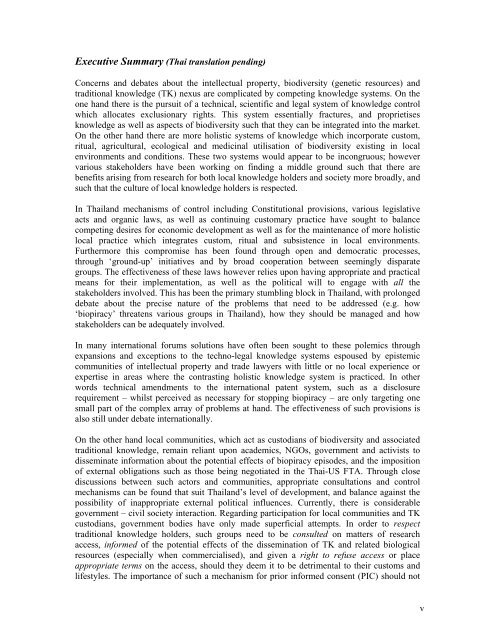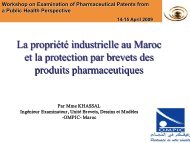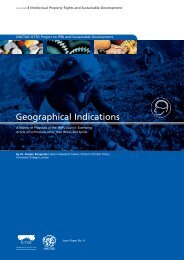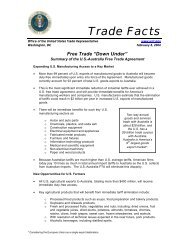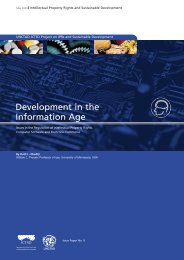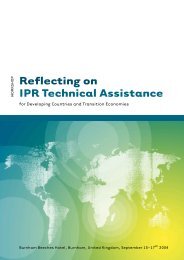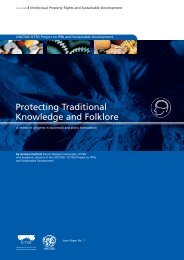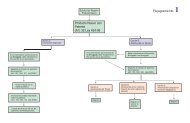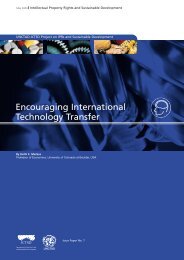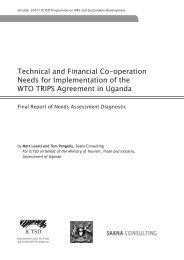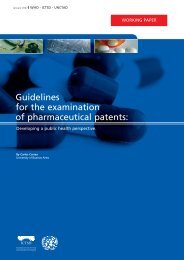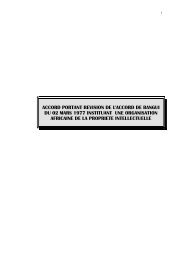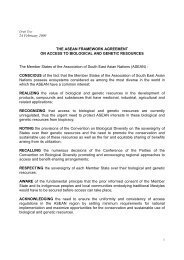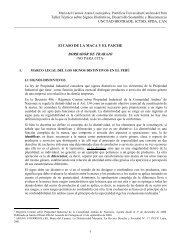Governance and Micropolitics of Traditional ... - IPRsonline.org
Governance and Micropolitics of Traditional ... - IPRsonline.org
Governance and Micropolitics of Traditional ... - IPRsonline.org
You also want an ePaper? Increase the reach of your titles
YUMPU automatically turns print PDFs into web optimized ePapers that Google loves.
Executive Summary (Thai translation pending)<br />
Concerns <strong>and</strong> debates about the intellectual property, biodiversity (genetic resources) <strong>and</strong><br />
traditional knowledge (TK) nexus are complicated by competing knowledge systems. On the<br />
one h<strong>and</strong> there is the pursuit <strong>of</strong> a technical, scientific <strong>and</strong> legal system <strong>of</strong> knowledge control<br />
which allocates exclusionary rights. This system essentially fractures, <strong>and</strong> proprietises<br />
knowledge as well as aspects <strong>of</strong> biodiversity such that they can be integrated into the market.<br />
On the other h<strong>and</strong> there are more holistic systems <strong>of</strong> knowledge which incorporate custom,<br />
ritual, agricultural, ecological <strong>and</strong> medicinal utilisation <strong>of</strong> biodiversity existing in local<br />
environments <strong>and</strong> conditions. These two systems would appear to be incongruous; however<br />
various stakeholders have been working on finding a middle ground such that there are<br />
benefits arising from research for both local knowledge holders <strong>and</strong> society more broadly, <strong>and</strong><br />
such that the culture <strong>of</strong> local knowledge holders is respected.<br />
In Thail<strong>and</strong> mechanisms <strong>of</strong> control including Constitutional provisions, various legislative<br />
acts <strong>and</strong> <strong>org</strong>anic laws, as well as continuing customary practice have sought to balance<br />
competing desires for economic development as well as for the maintenance <strong>of</strong> more holistic<br />
local practice which integrates custom, ritual <strong>and</strong> subsistence in local environments.<br />
Furthermore this compromise has been found through open <strong>and</strong> democratic processes,<br />
through ‘ground-up’ initiatives <strong>and</strong> by broad cooperation between seemingly disparate<br />
groups. The effectiveness <strong>of</strong> these laws however relies upon having appropriate <strong>and</strong> practical<br />
means for their implementation, as well as the political will to engage with all the<br />
stakeholders involved. This has been the primary stumbling block in Thail<strong>and</strong>, with prolonged<br />
debate about the precise nature <strong>of</strong> the problems that need to be addressed (e.g. how<br />
‘biopiracy’ threatens various groups in Thail<strong>and</strong>), how they should be managed <strong>and</strong> how<br />
stakeholders can be adequately involved.<br />
In many international forums solutions have <strong>of</strong>ten been sought to these polemics through<br />
expansions <strong>and</strong> exceptions to the techno-legal knowledge systems espoused by epistemic<br />
communities <strong>of</strong> intellectual property <strong>and</strong> trade lawyers with little or no local experience or<br />
expertise in areas where the contrasting holistic knowledge system is practiced. In other<br />
words technical amendments to the international patent system, such as a disclosure<br />
requirement – whilst perceived as necessary for stopping biopiracy – are only targeting one<br />
small part <strong>of</strong> the complex array <strong>of</strong> problems at h<strong>and</strong>. The effectiveness <strong>of</strong> such provisions is<br />
also still under debate internationally.<br />
On the other h<strong>and</strong> local communities, which act as custodians <strong>of</strong> biodiversity <strong>and</strong> associated<br />
traditional knowledge, remain reliant upon academics, NGOs, government <strong>and</strong> activists to<br />
disseminate information about the potential effects <strong>of</strong> biopiracy episodes, <strong>and</strong> the imposition<br />
<strong>of</strong> external obligations such as those being negotiated in the Thai-US FTA. Through close<br />
discussions between such actors <strong>and</strong> communities, appropriate consultations <strong>and</strong> control<br />
mechanisms can be found that suit Thail<strong>and</strong>’s level <strong>of</strong> development, <strong>and</strong> balance against the<br />
possibility <strong>of</strong> inappropriate external political influences. Currently, there is considerable<br />
government – civil society interaction. Regarding participation for local communities <strong>and</strong> TK<br />
custodians, government bodies have only made superficial attempts. In order to respect<br />
traditional knowledge holders, such groups need to be consulted on matters <strong>of</strong> research<br />
access, informed <strong>of</strong> the potential effects <strong>of</strong> the dissemination <strong>of</strong> TK <strong>and</strong> related biological<br />
resources (especially when commercialised), <strong>and</strong> given a right to refuse access or place<br />
appropriate terms on the access, should they deem it to be detrimental to their customs <strong>and</strong><br />
lifestyles. The importance <strong>of</strong> such a mechanism for prior informed consent (PIC) should not<br />
v


